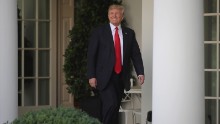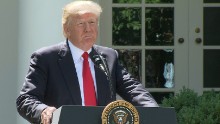begin quote from:
Macron getting in Trump's face
The Paris climate decision is classic Trump
Emmanuel Macron is getting in Donald Trump's face
Story highlights
- France's new leader is barely three weeks into his job
- Macron tells US he wants to "make our planet great again"
Washington (CNN)Emmanuel Macron, France's youthful president, has only been a world leader for less than three weeks.
Yet
he's already seized a role as a bastion of liberal global values,
staring down both US President Donald Trump and Russian President
Vladimir Putin, two of the biggest threats to the political consensus
that has dominated Western politics for decades.
Macron's most audacious intervention yet came on Thursday night, in a remarkable video address to the American people
responding to Trump's withdrawing the US from the Paris climate accord
that quickly went viral. The message: Trump is an outlier against the
values that made his own nation great, despite his mantra that only he
can restore US greatness.
"Tonight
I wish to tell the United States, France believes in you. The world
believes in you. I know that you are a great nation," Macron said in the
video against a backdrop of the French tricolor and the flag of the
European Union.
"I
know your history, our common history," he said, calling on scientists,
engineers and "responsible citizens" disappointed by Trump's decision
to find a "second homeland" in France to work together on concrete
solutions to save the planet.
Macron's flagrant foray into domestic US politics mined outrage among Trump's US opponents at his actions but it was also risky.
While
his video delighted progressives in the United States who quickly
shared it on Facebook and Twitter, it is not clear that a majority of
Americans will appreciate a lecture from a French president, even one as
polite and respectful as Macron.
After all, Trump directly made an "America First" argument meant to discount the influence of other nations.
"It
is time to put Youngstown, Ohio, Detroit, Michigan, and Pittsburgh,
Pennsylvania, along with many, many other locations within our great
country, before Paris, France," Trump said at the White House Thursday.
By
co-opting the President's campaign theme when he said he wanted to
"make our planet great again," Macron picked a fight with an adversary
who is notoriously conscious about personal slights and lashes out
against any sign of public humiliation. There may be a price to pay for
Franco-US relations.
Still,
Macron's appeal to Americans opposed to the President's decision on
Paris appeared to be an attempt to shape the answer to a question that
is circulating in European capitals right now. Is Trump's presidency and
retreat from multilateral global solutions a blip, or will it outlive
his White House and become a new normal for America's global role that
will fundamentally restructure the global system?
Macron,
who was endorsed by former President Barack Obama during his recent
election win, was laying a bet that Americans will eventually repudiate
the President and return their nation to its global role.
Filling leadership void? And French elections near
The timing of the video was no accident
Speaking
moments after hanging up after a phone call with Trump, Macron was
making a clear bid to fill the global leadership vacuum that many allies
perceive was left by the US decision to walk away from global efforts
to combat climate change.
He was also breaking the mold of his own job.
Macron
chose to address Americans, and the world, in English in a highly
unusual move for a French president, the most high-profile guardian of a
Francophone culture that is often seen in France us under siege from
the march of English across the globe.
It
was a decision in keeping with the way Macron has quickly consolidated
his power in France, shouldering the stagecraft of the presidency as he
seeks to dominate parliamentary elections this month that are crucial to
his hopes of pulling off sweeping labor and economic reforms.
The
video was not the first time that Macron had faced down Trump. When the
two men met for the first time in Brussels last week, they exchanged a
white knuckle handshake that looked more like an arm wrestle.
Macron
later told a French newspaper that the showdown was a "moment of truth"
that demonstrated he would not make even small concessions to the US
President.
Standing up to Putin
Macron
put on another macho show of defiance when he met Putin on Monday at
the Palace of Versailles, the resplendent former seat of French
monarchs.
Macron
lavished Putin with pomp and respect and drew analogies to Peter the
Great, who founded the Russian leader's home city of St. Petersburg and
visited France as part of a process of opening his nation to western
influences in the 17th Century.
But
Macron publicly complained during their joint press conference that
Russia state news networks had acted as "agents of influence" and "lying
propaganda" during an election in which the Kremlin favored his right
wing rival Marine Le Pen.
The
comments marked the most personal denunciation yet of alleged Russian
attempts to intervene in elections by a Western leader and contrasted
with Trump's unwillingness to accept that Moscow intervened in order to
boost his candidacy last year.
Macron's
gambit towards Putin and Trump is a clear sign that despite his
relative youth — he is 25 years younger than the Russian leader and 30
years younger than Trump -- he will not be bullied by strongman leaders.
His
victory over Le Pen's French version of the populism that has been
sweeping democracies has already elevated him to the top tier of Western
leadership, alongside German Chancellor Angela Merkel.
But
his inexperience, and Trump's capricious nature mean that Macron may be
playing with fire. Other leaders, like British Prime Minister Theresa
May and Canadian Prime Minister Justin Trudeau have not chosen to be so
open with their criticisms of the American President.
Trump
tends to respond most favorably to flattery and respect offered to him
by the likes of Japanese Prime Minister Shinzo Abe, Chinese President Xi
Jinping and the Saudi royal family on his recent overseas visit.
Trump annoyed by European leaders?
A
source who spoke with Trump after the G7 summit last week told CNN's
Kevin Liptak Friday that the President was annoyed after sitting through
lectures from leaders including Macron and Merkel about the Paris
accord.
His
comments Thursday played into the enduring conceit in American politics
that Paris and France epitomize effete, liberal, globalized elites that
are the antithesis of the earthly, honest American values on which
Trump built his appeal to the Midwestern voters who made him President.
He
returned home from Italy believing that European leaders had ganged up
on him and sought to forcibly move him from a position he believes is
politically advantageous, the source said.
Such
perceptions are one reason why publicly confronting Trump over his
policies -- as Merkel has also done in recent days -- may backfire and
further imperil the transatlantic alliance which is vital to French and
German security.
They also reveal the conundrum foreign leaders face in the age of Trump.
The
US President's personality and policies are so polarizing that their
own political interests force them to adopt a confrontational stance
towards him. But that attitude inevitably further alienates Trump and
pushes him in a direction that is even more retrograde to the interests
of US allies.



















No comments:
Post a Comment